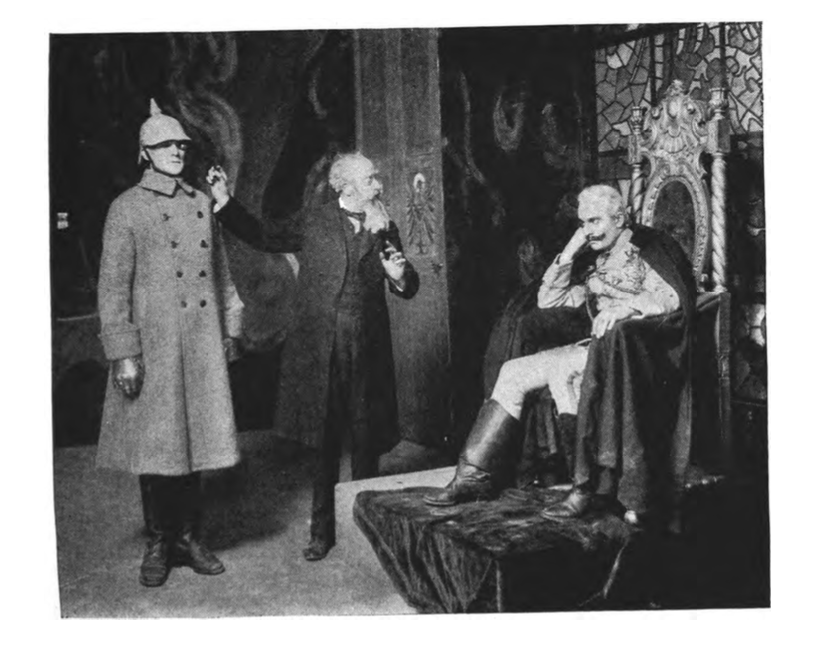BLOOD AND IRON (2)
By:
November 15, 2023

“Blood and Iron: A Play in One Act,” A Radium Age proto-sf ancestor of The Six Million Dollar Man and RoboCop, was first published in the December 1917 issue of The Strand. (Note that the play predates Karel Čapek’s “R.U.R.: Rossum’s Universal Robots” by four years.) HiLoBooks is pleased to serialize it here for HILOBROW’s readers.
ALL INSTALLMENTS: 1 | 2 | 3 | 4 | 5 | 6 | 7 | 8.
EMPEROR (without enthusiasm): My time is limited. The Crown Prince awaits me.
SCIENTIST (quivering with enthusiasm): When your Majesty comprehends this greatest of all birthday gifts — a million cripples transformed into a million fighting units! — your Majesty’s might becomes terrible!
EMPEROR (indulgently): Generalities!
SCIENTIST: I particularize (as EMPEROR makes sharp gesture that he is ready to listen). The key-note of efficiency is the elimination of waste. Our problem was to eliminate the waste represented by the wounded. In brief, we have succeeded.
EMPEROR (beginning to display interest): How so?
SCIENTIST: After countless experiments we can now take a soldier, no matter how badly wounded, and return him to the trenches — a super-soldier — no longer a bungling, mortal man — but a beautiful, efficient machine!
EMPEROR (laughing): You are enthusiastic but — not contagious! (deprecatory gesture) — but — (sternly) your promises have not always been kept. The proof!
SCIENTIST: (with impulsive devotion): Your Majesty, I foresaw your doubts. I brought —
EMPEROR: Ha! A — specimen!
SCIENTIST (appreciating the jeu d’esprit): Perfectly ! He is in the ante-room.
EMPEROR (curtly): Bring him in! Bring him in!
SCIENTIST: Er — I beg your Majesty’s pardon — but — he is not — altogether pleasant to look upon.
EMPEROR: Nonsense! Whatever makes for the strength of the dynasty is agreeable to the Imperial eyes.
SCIENTIST (with tremulous delight): May I?
EMPEROR: Certainly! Make haste!
SCIENTIST (nimbly crosses to door, opens it, and ejaculates command): Attention! Forward! Hep! (There is a momentary silence, then a metallic clatter as if caused by a movement of iron, then a heavy step. ENTER 241 erect, with measured tread, observing nothing. He comes down to centre of stage, where he stops in response to the SCIENTIST’s order): Halt!
(As 241 stands at military attention the SCIENTIST, with manifest delight, flutters bowing before EMPEROR and explains) The ultimate triumph! — our two hundred and forty-first experiment. Hence — Number Two Hundred and Forty-One! (During this explanation 241 does not stir. The EMPEROR stares at 241 with a sort of horrified fascination.)
EMPEROR: He — marches — splendidly!
SCIENTIST: The least of his accomplishments. Permit me! (Returns to 241 , whom he prods, 241 remaining impassive.) Magnificent! (gesture of approval as he carries on inspection of arms, hands, body and head of 241. Runs finger around left eye, taps gently left ear. Contemplates ensemble and makes gesture for 241 to open mouth. 241 opens mouth and shows glittering array of metallic teeth; he shuts them with click like a steel trap). Perfection! Right arm! (241 lifts right arm in stiff but sweeping gesture.) Left knee! (241 crooks left knee twice.) Hands! (241 opens and closes both cotton-gloved hands and manipulates fingers.)
RADIUM AGE PROTO-SF: “Radium Age” is Josh Glenn’s name for the nascent sf genre’s c. 1900–1935 era, a period which saw the discovery of radioactivity, i.e., the revelation that matter itself is constantly in movement — a fitting metaphor for the first decades of the 20th century, during which old scientific, religious, political, and social certainties were shattered. More info here.
SERIALIZED BY HILOBOOKS: James Parker’s Cocky the Fox | Annalee Newitz’s “The Great Oxygen Race” | Matthew Battles’s “Imago” | & many more original and reissued novels and stories.
